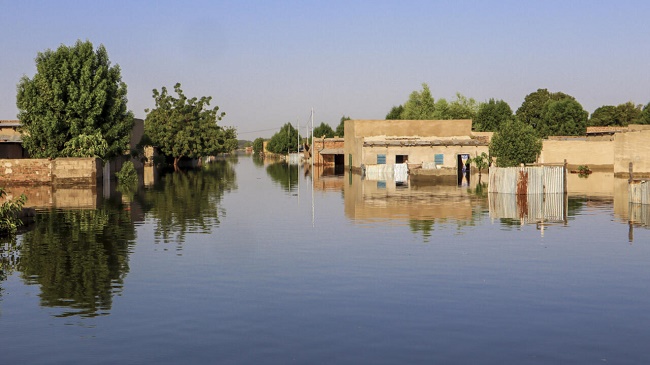Deputy Director of Chad’s National Meteorological Agency, Hamid Abakar Souleymane, waggled his finger up and down to demonstrate how a motionless humidity gauge at the agency’s headquarters should have been working.

The broken hygrothermograph was among the dustblown outdoor equipment in the capital N’Djamena that is meant to help the agency known as ANAM to track weather patterns.
The situation in Chad is replicated across much of Africa, a continent sorely lacking the reliable forecasts that are a keystone of disaster management as climate change makes extreme weather more frequent.
At COP29 climate talks on Wednesday, November 13, 2024, UN Secretary-General Antonio Guterres called for urgent action to overcome a shortage of data and funding.
The aim is to meet a target for universal protection by end-2027 from early warning systems to help preparation for extreme weather events.
For Chad, that appears a particularly ambitious goal.
Around 80 per cent of the devices at the agency’s site in N’Djamena are not operational, Deputy Director Hamid Abakar Souleymane told Reuters in October, as Chad battled another season of devastating floods.
“The reliability of weather information depends on the resources invested in producing it,” he said, describing a relentless push for more funding and trained personnel.
Africa, a continent of 1.5 billion people, has the world’s least-developed weather and climate observation network with fewer stations operating to global basic standards than Germany, according to the World Meteorological Organisation.
“There are many declared stations that exist or may not exist.
“Many of them are not sharing data,” said Albert Fischer, director of the WMO Integrated Global Observing System division.
As of the third quarter of 2024, only two out of 53 African WMO countries were compliant with basic requirements for ground-level observation stations, Fischer said.
Being unprepared has deadly consequences. Floods not only happen more often across Africa than in Europe and North America combined, but they kill four times more people on average due to a lack of preparedness and warnings, a 2023 article in the journal Nature said.
Good weather data alone is not enough, as evidenced by deadly floods in October in Spain when some local authorities were blamed for failing to raise the alarm in time.
Chad’s plight nevertheless shows the scale of what can happen when disaster strikes one of the most vulnerable and data-poor regions on earth.
Heavier-than-usual seasonal rains in parts of West and Central Africa drove rivers to break their banks in recent months, leading to floods in every one of Chad’s provinces with 1.9 million people affected, over 570 killed, and 72,000 heads of cattle swept away.
“Everywhere is flooded. We have lost our fields of sorrel, beans, and grain.
“Everything is destroyed now because no one warned us of such a catastrophe,” mother-of-four Josiane Allasra said, speaking at a makeshift camp for displaced people on the outskirts of N’Djamena in late October.
“We’re hungry and we have nowhere to shelter our children.”
ANAM did not have the resources to track the worsening conditions as the disaster unfolded across a country the size of France and Spain combined.
“We have significantly less than we need.
“We need stations and we need funding,” Souleymane said during a tour of ANAM’s N’Djamena facilities, where stacks of old weather data spilled out over the floor of the archive and packaged equipment gathered dust.
A 2023 review of Chad’s hydromet capacity, found that it had just two trained forecasters, making round-the-clock forecasting and warning impossible.
The agency also lacks the financial and technical means to maintain a network of new automatic weather stations from the United Nations Development Programme (UNDP), which anyway only covered the south and centre of the country, the report said.
“There’s a lot of wasted investment and infrastructure that is scattered … around Africa,” said Ana Heureux, programme management officer at a UN fund that supports countries like Chad to close their vast data gaps.
Under a five-year programme, the Systematic Observations Financing Facility (SOFF) plans to help Chad upgrade or launch 34 weather stations to global observation standards.
Chad currently has one surface-land weather station.
To avoid a situation in which authorities find themselves with technology they do not have the expertise and funds to maintain, SOFF’s strategy includes making use of advisers from developed countries.
Once up-and-running, countries will continue to receive SOFF support provided they share their data internationally, Heureux said.
“Finally, we have one fund that’s dedicated to long-term support,” said the WMO’s Fischer.
Since mid-2022, SOFF has supported 23 African countries.
However, its funding outlook is uncertain. Since 2020, it has raised 94 million dollars out of a target of 200 million dollars by 2025.
There “has been a bit of a challenging fundraising donor environment, with everything happening in the world,” said Heureux, adding that SOFF hoped to close the gap including via a big fundraising push at COP29.
